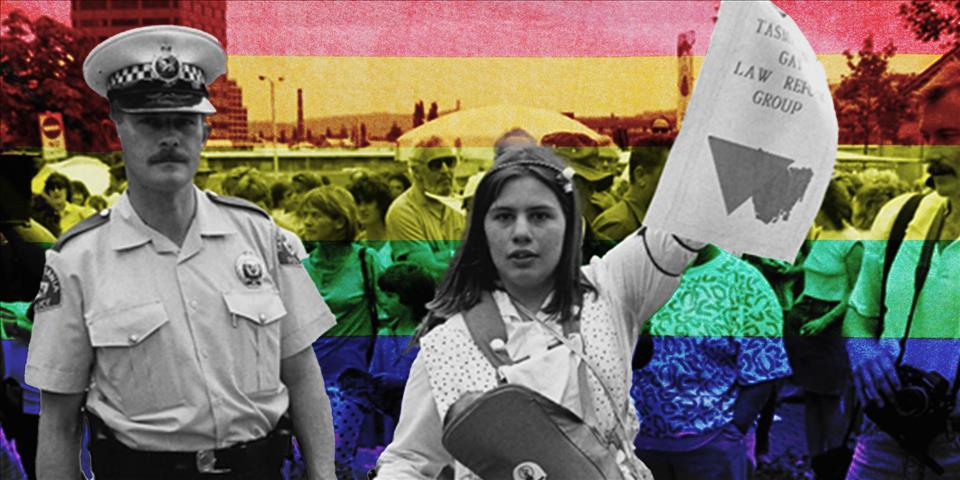Tasmania Will Compensate People For Historical LGBTQIA+ Convictions. Could Others Follow Suit?
The laws, which have bipartisan support, will provide compensation for those historically convicted of homosexuality and cross-dressing offences. They also expand hate crime provisions to LGBTQIA+ people.
This is nation-leading reform to enforce the rights of LGBTQIA+ people. Tasmania is the first jurisdiction in the country to offer compensation for those affected by these now-abolished crimes.
This is especially significant given the state's fraught history of criminalising homosexuality and cross-dressing up until the end of the last century.
The redress scheme comes after Australia-first gender recognition laws in 2019, and the official recognition of asexual and agender people in all of the Tasmanian government's activities with community since 2023.
The government is also pursuing sentencing reforms to give judges the power to impose tougher sentences for hate crimes against LGBTQIA+ people (and others). These changes go beyond those in other states by allowing courts to take“demonstrated hostility” into account.
A violent, traumatic historyTasmania has not always been a leader in advocating for the rights of LGBTQIA+ people.
By 1990, most Australian states had decriminalised homosexuality , with South Australia leading the change in 1975.
But it was not until 1997, under significant national and international pressure, that Tasmania decriminalised male same-sex relationships. Same-sex relationships between women were never criminalised.
Before 1997, relationships between men in Tasmania were punishable by up to 21 years in prison, which was the harshest penalty in the western world. Tasmania was also the only Australian state to criminalise cross dressing .
It's estimated approximately 100 men were convicted for“unnatural sexual intercourse” and“gross indecency” between 1945 and the mid-1980s.
In 1991, the Australian government had signed onto the International Covenant on Civil and Political Rights. This enabled people to submit complaints about rights violations in their home countries to the United Nations Human Rights Council.
Tasmanian man Rodney Croome, along with his partner at the time, Nick Toonen, submitted the first Australian complaint to the commission in 1994. Their local efforts to change Tasmania's punitive laws on male same-sex relationships had been unsuccessful.
In Toonen vs Tasmania , the commission found the state of Tasmania had violated his right to privacy and distinguished between people on the basis of sexual activity, sexual orientation and identity. Both these things meant gay men were not equal under the law.
This paved the way for the landmark federal Human Rights (Sexual Conduct) Act , which overrode the Tasmanian law criminalising homosexuality.
A High Court ruling in Croome vs Tasmania followed. It found the Commonwealth government had the power under an international treaty to enact legislation decriminalising homosexual acts in Tasmania.
The United Nations case also mandated anti-LGBTQIA+ discrimination laws, which set an international precedent for the decriminalisation of same-sex relationships across the world.
A rainbow transformationAs the current legislation was tabled in parliament, advocacy group Equality Tasmania noted that many victims of the state's former laws suffered loss of employment, housing, family and friends.
Many left the state forever. All lived with the trauma of public ignominy and criminal stigma. Some still do.
According to legal scholar Allen George , the homosexual and cross dressing expungement laws offer a form of“therapeutic justice”.
Therapeutic justice is justice that considers not just the law, but the social conditions as well, especially those that affect the wellbeing of victims.
While there is no compensation adequate for the harms caused by the now-abolished laws, advocates say the redress scheme will help make up for the pain and loss victims experienced, and:
Croome, who is now a LGBTQIA+ rights activist, says Tasmania has been transformed from“Bigots Island to the Rainbow Isle”.
Victim-survivors can have their charges, convictions or both expunged under existing legislation, and will automatically receive a payment.
They will be eligible for $15,000 for a charge, $45,000 for a conviction, and $75,000 if they were sentenced to detention or psychiatric care.
These amounts were supported by expert advice to a 2024 inquiry by the Tasmanian parliament's Gender and Equality Committee after it reviewed similar schemes in Europe and Canada.
Could other states follow?This redress for past harms could lead to similar law reform across Australia.
Other states and territories are likely to consider following Tasmania's lead and enact redress schemes for those arrested under their former anti-gay laws.
The Commonwealth may also consider redress for harms inflicted in the past.
Read more: An inquiry has recommended Australia legislate a Human Rights Act. Here's why we need one
The Tasmanian reform may also initiate an overdue debate in Australia about how we as a nation respond to past injustices and work towards the prevention of human rights violations.
This case highlights the patchwork of inconsistent LGBTQIA+ rights across the country. This inconsistency may only be resolved by a comprehensive, national Bill of Rights or Human Rights Act .
This broader agenda will extend Australian governments' consideration of the human rights of all Australians.
The authors would like to thank Rodney Croome for his insights and knowledge of historical and contemporary LGBTQIA+ law reform

Legal Disclaimer:
MENAFN provides the
information “as is” without warranty of any kind. We do not accept
any responsibility or liability for the accuracy, content, images,
videos, licenses, completeness, legality, or reliability of the information
contained in this article. If you have any complaints or copyright
issues related to this article, kindly contact the provider above.
Most popular stories
Market Research

- Utila Triples Valuation In Six Months As Stablecoin Infrastructure Demand Triggers $22M Extension Round
- Cregis Joins TOKEN2049 Singapore 2025
- Jpmorgan Product Head Joins GSR Trading MD To Build Institutional Staking Markets
- Stratx Launches Compliance-Aware Routing Protocol For Stablecoins, Rwas, And Cross-Border Settlement
- “Farewell To Westphalia” Explores Blockchain As A Model For Post-Nation-State Governance
- DOLLUM Expands Wallet Opportunities, Introducing New Security Features Following The DOL Token Sale




















Comments
No comment